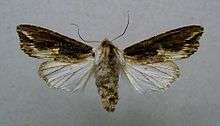Egira conspicillaris
Egira conspicillaris, the silver cloud, is a moth of the family Noctuidae. The species was first described by Carl Linnaeus in his 1758 10th edition of Systema Naturae. It is found from the Iberian Peninsula to Russia. In the north it ranges to the Baltic Region and in the south to North Africa. It is also present in Western Asia, up to the Caspian Sea.
| Egira conspicillaris | |
|---|---|
 | |
| Scientific classification | |
| Kingdom: | |
| Phylum: | |
| Class: | |
| Order: | |
| Family: | |
| Genus: | |
| Species: | E. conspicillaris |
| Binomial name | |
| Egira conspicillaris | |
| Synonyms | |
| |
Description
The wingspan is 36–44 mm. Forewing pale lilac grey in lower half, becoming pale lilac brown in costal; markings usually much confused; inner line and median shade thick, brown; claviform stigma outlined with black; orbicular round, reniform large, both pale; outer line denoted by a row of black dashes on veins; marginal area beyond submarginal line darker; hindwing pearly white, slightly tinged with grey; the apex and veins brown; — ab. melaleuca View. has the forewing suffused with dark brown or black, except the inner area and a narrow praesubmarginal band, which are pearly grey or white; — in the ab. intermedia Tutt the outer costal half of wing is also pale brownish grey; both of these aberrations are commoner than the pale type form.[1]
Biology
Adults are on wing from April to May in one generation per year.
The larvae feed on Genista tinctoria, Cytisus scoparius and Clematis vitalba. Other recorded food plants include Prunus spinosa, Prunus domestica, Fraxinus and Rumex species.[2]
References
- Seitz, A. Ed., 1914 Die Großschmetterlinge der Erde, Verlag Alfred Kernen, Stuttgart Band 3: Abt. 1, Die Großschmetterlinge des palaearktischen Faunengebietes, Die palaearktischen eulenartigen Nachtfalter, 1914
- Robinson, Gaden S.; Ackery, Phillip R.; Kitching, Ian J.; Beccaloni, George W.; Hernández, Luis M. (2010). "Search the database - introduction and help". HOSTS - A Database of the World's Lepidopteran Hostplants. Natural History Museum, London.
External links
| Wikimedia Commons has media related to Egira conspicillaris. |
- Kimber, Ian. "73.251 BF2181 Silver Cloud Egira conspicillaris (Linnaeus, 1758)". UKMoths. Retrieved 30 June 2019.
- Savela, Markku. "Egira conspicillaris (Linnaeus, 1758)". Lepidoptera and Some Other Life Forms. Retrieved 30 June 2019.
- Lepiforum e.V.
- Schmetterlinge-Deutschlands.de